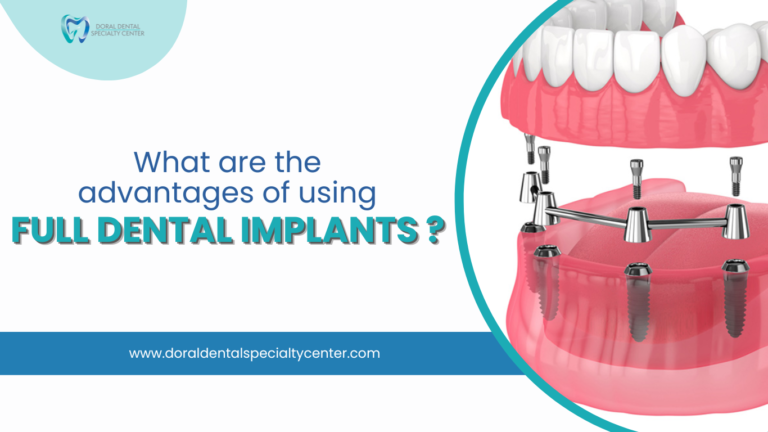Wisdom Tooth Extraction: Healing Time, Aftercare, and Benefits in Doral, FL
Wisdom Tooth Extraction: Healing Time, Aftercare, and Benefits in Doral, FL

Wisdom tooth extraction is one of the most common dental procedures, often necessary to prevent overcrowding, infections, and discomfort. Wisdom teeth, or third molars, typically emerge between the ages of 17 and 25, but not everyone has enough space in their mouth to accommodate them. When they become impacted, misaligned, or cause pain, removal is often the best solution. If you’re searching for “wisdom teeth removal near me” or considering extracting wisdom teeth in Doral, FL, Doral Dental Specialty Center is here to help. With experienced specialists like Dr. Martin Fernandez-Feo, Dr. Carlos Fernandez-Feo, Dr. Alexandra Botero, and Dr. Adriana Echenagucia, you can receive top-quality care in a comfortable environment. They proudly serve Miami Springs, Virginia Gardens, Hialeah, Medley, Sweetwater, Westchester, and Fontainebleau, offering 0% financing to make treatment more accessible.
The wisdom tooth extraction process is a routine surgical procedure performed under local anesthesia, sedation, or general anesthesia, depending on the complexity of the case. The dentist or oral surgeon carefully removes the wisdom teeth by making small incisions in the gum if necessary. In some cases, the tooth may need to be broken into smaller pieces for easier removal. Once the extraction is complete, the area is cleaned, and stitches may be placed to promote healing. While the procedure itself is straightforward, the healing process is just as important to ensure a smooth recovery and avoid complications such as infection or dry socket.
One of the most common concerns patients have is how long it takes to heal after wisdom tooth extraction. The initial healing phase, which includes swelling and mild discomfort, typically lasts three to seven days. Most patients feel well enough to return to their normal activities within a week, though full recovery of the gum tissue and bone may take three to six months. During this time, new bone will grow in the extraction site, and the gums will completely close. The speed of healing depends on factors such as the complexity of the extraction, the patient’s overall health, and how well aftercare instructions are followed.
Proper aftercare is crucial for preventing complications and ensuring a smooth recovery. One of the most important steps is to keep the blood clot in place to avoid dry socket, a painful condition that occurs when the clot dislodges, exposing the underlying bone. Patients should avoid drinking through a straw, spitting forcefully, or smoking for at least a week. Applying ice packs to the outside of the face for the first 24 hours can help reduce swelling, and over-the-counter or prescribed pain medication can manage discomfort. Additionally, sticking to a soft food diet, including soups, yogurt, mashed potatoes, and smoothies, will prevent irritation to the surgical site.
Maintaining oral hygiene after wisdom tooth extraction is essential but should be done carefully. Patients should avoid brushing near the extraction site for the first 24 hours and instead rinse gently with warm saltwater. After the initial day, brushing can resume, but with extra caution around the affected area. If antibiotics are prescribed, they should be taken as directed to prevent infections. Any signs of severe pain, excessive bleeding, or swelling that worsens instead of improving should be reported to the dental office immediately.
Removing wisdom teeth offers several long-term benefits for oral health. One of the primary advantages is preventing future dental problems such as overcrowding, infections, and cyst formation. Impacted wisdom teeth can press against neighboring molars, leading to misalignment and increased risk of decay. Extraction also reduces the chances of gum disease, as wisdom teeth can be difficult to clean properly. For patients who experience chronic pain due to impacted wisdom teeth, removal can provide significant relief and improve overall quality of life.
At Doral Dental Specialty Center, patients receive expert care tailored to their needs. With a team of specialists, including Dr. Martin Fernandez-Feo, Dr. Carlos Fernandez-Feo, Dr. Alexandra Botero, and Dr. Adriana Echenagucia, the practice is dedicated to ensuring a comfortable and stress-free experience. Whether you need a simple extraction or a more complex surgical removal, their expertise and advanced techniques guarantee the best outcomes. Plus, with 0% financing options, patients can receive the care they need without financial stress.
If you are considering extracting wisdom teeth in Doral, FL, it is natural to have questions. Below are some frequently asked questions to help you better understand the procedure and what to expect:
- How do I know if I need my wisdom teeth removed?If you experience pain, swelling, infection, or crowding due to your wisdom teeth, your dentist may recommend extraction. X-rays can help determine if removal is necessary.
- Is the procedure painful?The procedure itself is not painful, as anesthesia or sedation is used. However, mild discomfort and swelling may occur during recovery, which can be managed with medication.
- How long does it take to recover from wisdom tooth extraction?Most patients recover within one to two weeks, though complete healing of the gums and bone can take several months. Following aftercare instructions helps speed up the process.
- What foods should I avoid after the extraction?Avoid hard, crunchy, spicy, and extremely hot foods for at least a week. Stick to soft foods like mashed potatoes, yogurt, and soups during the initial healing period.
- Can I go back to work or school after the procedure?Most patients need at least one to three days of rest before resuming normal activities. However, those with more complex extractions may need additional recovery time.
- What should I do if I have severe pain or excessive bleeding after the extraction?Severe pain, prolonged bleeding, or signs of infection should be reported to your dentist immediately for further evaluation and care.








